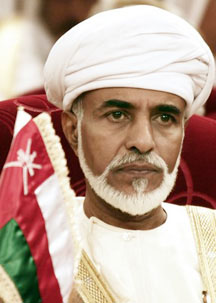MUSCAT, (Reuters) – Oman’s ruler has decided to cede some legislative powers to a partially elected council, the state news agency reported yesterday, in an apparent effort to quell protests in the Gulf Arab sultanate.
The ONA agency also said Sultan Qaboos bin Said would double monthly welfare payments and increase pension benefits, becoming the latest Gulf ruler to offer handsome handouts to citizens in the wake of unrest that has rocked much of the Arab world.
The normally tranquil Oman, an oil-producing nation at the mouth of the Gulf, was stunned by protests in at least two cities last month that left one person dead.

The sultan, who has ruled Oman for 40 years, sacked a string of ministers in a recent cabinet reshuffle and yesterday appeared to make his biggest concession yet by announcing that he would offer lawmaking powers to the Oman Council.
At present, only the sultan and his cabinet can legislate.
The Oman Council, which previously only offered policy advice, consists of the elected Shura Council and the State Council, made up of members appointed by the sultan himself. “A technical committee of experts shall be constituted to develop the draft amendment of the Basic Law of the State,” ONA quoted Sunday’s royal decree as saying, adding the group would have to report back in 30 days.
The sultan’s move was met with by a mixture of scepticism and hope by protesters who have spent days camped outside the Shura Council to demand jobs, better living conditions and political reforms.
“It does not mean much at the moment. We will celebrate when the Shura Council is granted real powers in the running of the government,” protester Hadi Suleiman said.
Faiz al-Ashour, another protester, said : “It looks good and it shows that the protests are beginning to bear results towards meaning political reforms.” The sultan’s announcement came on the day workers at two Oman firms went on strike to demand a wage hike, as simmering protests in the sultanate spilled over into the private sector.
Staff of Oman International Bank and Oman Invest and Finance Company walked off the job in the morning and stood in silent protest in front of their offices.
“Our demands are very simple, we want higher pay and more overtime,” said Mohammed al-Balushi, an employee at OIFC.
OIB is Oman’s fifth-largest bank by assets, while the OIFC is an investment and services company.
Bank Muscat, the country’s largest financial institution, agreed to increase its salaries on Sunday after workers there had staged a strike a day earlier. Oman Air also made concessions last week to head off strike action.
Looking to ease social tensions, Gulf Arab oil producers on Thursday launched a $20 billion aid package for their less prosperous neighbours Oman and Bahrain — a job-generating measure that should enable the two countries to upgrade their housing and infrastructure.





